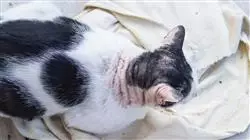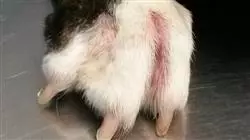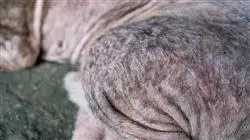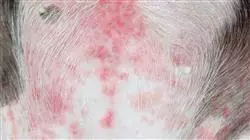University certificate
The world's largest faculty of veterinary medicine”
Description
Veterinarians must continue their training to adapt to new developments in this field”

Dermatology is possibly the specialty within pet veterinary medicine that is most frequently encountered in daily clinical practice.
Because of this, and taking into account its importance, the program of this postgraduate diploma has been developed by a highly-regarded veterinary teaching team in Veterinary Dermatology.
The combination of experience, both theoretical and practical, allows the veterinary professional to develop, first hand, specialized knowledge to carry out a good diagnosis and treatment of dermatological diseases from the theoretical point of view, with the latest developments and scientific advances and from the extensive practical experience of all teachers. The combination of a great team of interrelated teachers is what makes this postgraduate diploma unique among all those offered in similar training.
The topics developed in the postgraduate diploma program address, with a high level of depth, the most important dermatoses of small animals, including dogs, cats and other non-traditional pets.
With this postgraduate diploma the veterinary professional acquires advanced knowledge of Veterinary Dermatology for daily clinical practice. The study system applied by this course provides a solid foundation in the specialized knowledge of the Dermatoses Related to the Immune System.
As it is an online program, the student is not conditioned by fixed schedules, nor do they need to move to physically move to another location. All of the content can be accessed at any time of the day, so you can balance your working or personal life with your academic life.
This training is the best option you can find to specialize in Dermatology in Small Animals and make more accurate diagnoses”
This postgraduate diploma in Dermatoses Related to the Immune System contains the most complete and up-to-date scientific program on the market. The most important features include:
- The development of case studies presented by Small Animal Dermatology experts.
- The graphic, schematic, and practical contents with which they are created, provide scientific and practical information on the disciplines that are essential for professional practice
- Breakthroughs in Dermatology in Small Animals
- Practical exercises where the self-assessment process can be carried out to improve learning
- Special emphasis on innovative methodologies in Dermatology in Small Animals
- Theoretical lessons, questions to the expert, debate forums on controversial topics, and individual reflection assignments
- Content that is accessible from any fixed or portable device with an Internet connection
This Postgraduate Diploma is the best investment you can make when choosing a refresher program to update your existing knowledge of Veterinary Dermatology"
The multimedia content, developed with the latest educational technology, will provide the professional with situated and contextual learning, i.e., a simulated environment that will provide immersive training programmed to train in real situations.
This program is designed around Problem Based Learning, whereby the specialist must try to solve the different professional practice situations that arise during the academic year. For this purpose, the professional will be assisted by an innovative interactive video system created by renowned and experienced experts in Dermatology in Small Animals and with extensive experience.
This training comes with the best didactic material, providing you with a contextual approach that will facilitate your learning"

This 100% online postgraduate diploma will allow you to combine your studies with your professional work while increasing your knowledge in this field"
Objectives
The postgraduate diploma in Dermatoses Related to the Immune System is aimed at facilitating the medical professional's performance with the latest advances and most innovative treatments in the sector.

Learn about the latest advances in the field from the comfort of your home, thanks to the online format of this program"
General Objectives
- Generate specialized and advanced knowledge regarding the skin
- Determine its pathophysiology in the general clinic of the individual as a whole
- Examine the concepts of microbiome and skin dysbiosis
- Identify the clinical signs and injury patterns associated with pyodermas, fungal dermatoses and protozoal dermatoses
- Delve into the different dermatoses of the module in their clinical, etiopathogenic, diagnostic and treatment aspects
- Establish the correct clinical and diagnostic approaches for each of the above diseases
- Learn about the most current treatments to control pyodermas, mycoses and protozoal dermatoses
- Identify the main ectoparasites that cause dermatosis
- Examine the most frequent and common parasitic dermatoses in daily clinical practice
- Identify the main allergic dermatoses affecting dogs and cats
- Analyze the different clinical manifestations associated with allergic dermatoses in dogs and cats and how to differentiate them from other dermatoses
- Propose an allergy diagnostic protocol to obtain a reliable diagnosis following current international recommendations
- Apply the multimodal and individualized therapeutic strategy of choice for each allergic patient, selecting the most appropriate treatments for the control of their clinical condition, following current international recommendations
- Examine autoimmune or immune-mediated diseases
- Analyze the lesional patterns associated with cutaneous autoimmune or immune-mediated diseases
- Determine an appropriate methodology for the diagnosis of immune-mediated and autoimmune skin diseases
- Develop expertise based on new findings on cutaneous autoimmune or immune-mediated diseases
- Analyze the pathophysiological basis of the endocrine mechanisms that are altered and give rise to cutaneous symptomatology
- Generate specialized knowledge on the processes related to hepatic, renal and digestive metabolism that produce skin anomalies
- Determine the genetic anomalies that give rise to hereditary dermatoses
- Develop detailed knowledge of the type of tests that should be used to confirm endocrine-metabolic dermatoses
- Analyze the most important cutaneous genodermatoses and the availability of genetic tests for the detection of carriers
- Examine the different types of generalized and localized disorders related to seborrhea, hyperkeratosis and all desquamation disorders
- Develop specialized knowledge and skills in the care of patients with behavioral problems and dermatological manifestations or patients with a dermatological process that may be aggravated by a behavioral process
- Examine cutaneous neoplasms and pseudo-neoplasms from the dermatologist's point of view
- Reach the diagnosis of the cell lineage and its approximate assessment with respect to the degree of malignancy, knowing how to assess the pathology and knowing the limits that may lead us to refer the case to an oncologist
- Generate specialized knowledge for the oncological therapeutic management of cutaneous neoplasms
- Analyze and manage one of the most frequent pathologies in dermatology such as external otitis
- Delve into the Dermatoses that require special attention due to their particular anatomical and differential situation
- Examine pathologies of the skin and their annexes in specific areas that require special attention such as the ear, eyelids, claws, nose, pads and anal area
- Compile the pathologies of these structures that will help us search for and locate the systemic diseases that cause them
- Establish normality in each animal species, small mammals, birds, reptiles and amphibians
- Analyze dermatological clinical signs associated with diseases according to whether they are management problems (environmental, nutritional, etc.), skin problems or systemic diseases
- Determine the diagnostic methods adapted to exotic animals
- Establish specific treatment guidelines for each species
Specific Objectives
Module 1. The Skin as an Organ Characteristics and Diagnostic Approach
- Specify the working methodology when the presence of a cutaneous autoimmune or immune-mediated disease is suspected
- Identify the differences between the various groups of autoimmune and immunemediated diseases
- Establish the differential diagnoses of auto-immune and immune-mediated diseases according to their injury pattern and clinical presentation
- Examine the classification of autoimmune and immune-mediated diseases
- Establish the most relevant autoimmune and immunemediated diseases in the canine and feline species
- Update the therapeutic approach to immune-mediated and autoimmune diseases
Module 2. Allergic Dermatoses
- Determine the main diagnostic techniques
- Analyze the biological cycle and zoonotic possibilities of the different parasites
- Identify ectoparasites that can act as vectorial transmitters of disease
- Develop the clinical picture of the different ectoparasitosis
- Analyze the differential diagnoses of the different diseases
- Explore the main treatments
- Examine the main antiparasitic drugs and their pharmacokinetics
Module 3. Immune-Mediated and Autoimmune Dermatoses
- Develop specialized knowledge of the characteristic clinical signs of each disease, the skin lesions, their distribution and how they evolve
- Analyze the pathogenic mechanism of each process
- Establish a list of differential diagnoses for each disease
- Select the most appropriate or conclusive diagnostic tests in each case.
- Determine the drugs for therapy and follow-up protocols
- Evaluate risk-benefit, in case of surgical options, adapted to each patient

A unique, key and decisive training experience to boost your professional development"
Postgraduate Diploma in Dermatoses Related to the Immune System
At TECH Global University, we present our Postgraduate Diploma in Dermatoses Related to the Immune System, designed specifically for veterinary professionals who wish to acquire specialized knowledge in the diagnosis and treatment of skin diseases in animals. This program is delivered through online classes, which gives you the flexibility to study from anywhere and adapt your learning to your schedule. With the convenience of online sessions, you will be able to access program content through our online platform, where you will find high-quality, interactive resources and support from our expert faculty in the field of veterinary dermatology. One of the advantages of our online classes is the ability to access them at any time and repeat lessons according to your needs. This allows you to study at your own pace and review key concepts as often as necessary to ensure a complete understanding of the content. In addition, you can consult with your teachers and participate in debates and discussions with other students through our online platform.
Expand your knowledge in veterinary dermatology
In the Postgraduate Diploma in Immune-Related Dermatoses program at TECH Global University, we will address immune-related skin diseases in animals. You will learn about the different dermatoses, their etiology, diagnosis and specific treatments. You will become familiar with the most advanced techniques in veterinary dermatology and you will be prepared to face the clinical challenges that may arise in your professional practice. Don't miss the opportunity to expand your knowledge in veterinary dermatology and become a specialist in the diagnosis and treatment of dermatoses related to the immune system. Join TECH Global University and acquire the skills necessary to provide quality animal care and meet the growing needs in this specialized field.







